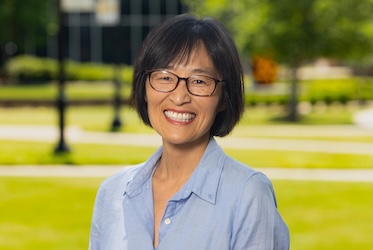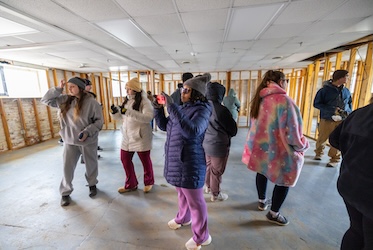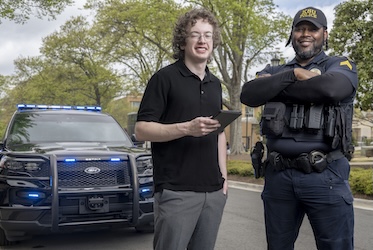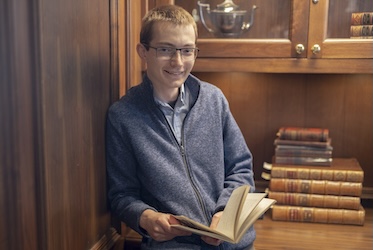
Saving Lives
KENNESAW, Ga. | Aug 28, 2017
It takes a community to fight the opioid epidemic

More than 200 people at Kennesaw State University have received a specific type of training, but it’s been put into practice only four times. However, all four of those occasions saved a life.
Kennesaw State’s nationally recognized Center for Young Adult Addiction and Recovery (CYAAR) trains members of the University community to administer naloxone, an antidote for heroin and other opioid overdoses. The goal is to have as many people as possible prepared to administer a life-saving nasal spray dose of naloxone, in light of the dramatic rise in opioid-related overdoses and deaths in the United States.
“We really are trying to stay progressive and cutting-edge because a disproportionate amount of people are overdosing and dying in our country,” CYAAR Director Teresa Johnston said. “It’s a challenge to prepare and equip people in the event that they can help somebody.”
Three years ago, KSU Police became the first university police department in Georgia to carry naloxone. The naloxone training given to those 40 officers has since expanded to about 170 other people at the University, including faculty, staff, resident assistants and other students.
Pocket-sized naloxone kits, containing a pre-packaged nasal spray, are available to anyone who has received the training and also are carried by the Department of Residence Life on-call staff every night on Kennesaw State’s two campuses. Along with the naloxone kits the CYAAR is able to purchase at an affordable price, WellStar Health System donated 100 kits.
“It’s absolutely critical to get these kits in people’s hands,” said Lindsay Montgomery, the CYAAR’s peer education coordinator and trainer. “We’re not going to cure addiction with naloxone kits, but we can save a life, if it comes to that.”
The number of overdose deaths involving opioids – including heroin and prescription pain pills such as morphine, codeine and oxycodone – has quadrupled in the U.S. since 1999, according to the Centers for Disease Control and Prevention. An average of 91 Americans die every day from opioid overdoses.
The opioid epidemic hit home for Johnston about five years ago, when she began seeing an increase in the number of students seeking help for heroin use. The CYAAR has 60 to 75 students in its program each academic year, and now more than half of them are in recovery from opiates.
“The nature of student alcohol and drug use is ever-evolving, and we must remain aware of new trends that endanger our students and new solutions to aid them,” said Jeff Cooper, director of residence life at Kennesaw State. “Every second counts in medical emergencies, so we are wise to take advantage of anything that would help us create more time.”
The trained faculty, staff and students have not yet encountered a situation to use a naloxone kit. However, KSU Police have on four occasions administered naloxone to students, each time reversing the effects of the overdose.
“The most important act we can do as police officers is be in the right place at the right time to save a life,” said Police Chief R.L. Stearns. “Naloxone gives our officers, and now more members of the KSU community, the right tool to make a difference when it matters most.”
Presidential Priority
Before he became Kennesaw State’s president, Sam Olens was committed to fighting drug abuse. As Georgia’s attorney general, Olens began an initiative that sent guest speakers to high schools throughout the state, explaining the dangers of drug addiction and sharing stories of recovery.
While overseeing that program, he met Johnston and several Kennesaw State students who had received recovery support services through the CYAAR. Olens and Johnston share a philosophy that those being treated for addiction are “people who are sick getting well, not bad people who are getting good.”
“Discussions about addiction being a disease rather than a felony can be uncomfortable discussions, but you can’t be in denial,” Olens said. “If you put your head in the sand, nothing occurs. The problem doesn’t go away; you have to fight it.”
The CYAAR’s education and advocacy efforts are driven by its research, which studies and defines the success of students in the program and others living in long-term recovery. That data is then utilized in addiction treatment and recovery support systems, including collegiate recovery programs nationwide, to further efforts for people to have sustainable, abstinence-based recovery.
“Some students will try drugs. The surprise is when you have a program as good as Teresa’s to assist the students,” Olens said. “This is all about saving lives – not just from the mortality perspective but from the community perspective.”
Kennesaw State’s efforts are helping raise awareness of the opioid epidemic in the U.S. “People of all backgrounds, races and socioeconomic groups are affected by heroin and other opioid use,” said Associate Professor of Social Work Carol Collard. “Now that increasing numbers of those in the middle and upper classes are dying, there is a different response than you’ve had historically. Now there’s heightened interest in treatment options rather than criminal justice consequences.”
Alumni Accomplishments
Every day, Todd Stumbo sees people from all walks of life dealing with drug and alcohol dependency. Stumbo, who earned a Human Services degree from Kennesaw State last year, overcame his own drug addiction to become CEO of Blue Ridge Mountain Recovery Center in the Atlanta suburb of Ball Ground.
He applauds his alma mater for being proactive in providing training to administer naloxone in case someone overdoses. However, he considers that to be just one aspect of the CYAAR’s larger mission to help students and enhance the community.
Stumbo and Blue Ridge Mountain Recovery Center support the CYAAR’s events each year, such as its scholarship breakfast and the fundraising masquerade ball. Stumbo thinks that the success stories shared at those events are the Center’s greatest asset.
“A lot of people can be trained on naloxone and save a life, but not very many people can inspire a life,” he said. “As an addict myself, what gave me hope was seeing these other people around me who went through this and made something out of their life.”
One of those successes is a CYAAR alumnus named Danny, who considers it a miracle that he graduated summa cum laude from Kennesaw State in 2015 – since he didn’t expect to live long enough to finish college.
Danny began using alcohol and drugs in high school, flunked out of college, had numerous arrests and stints in rehab, and was fired from multiple jobs. He lived at an abandoned construction site for a while before moving in with a girlfriend, but staged a burglary at their home and pawned her belongings. He tried to make amends by giving her an engagement ring – which he bought with a stolen credit card. “It was a sad life,” he said. “I’d regularly think of killing myself, but didn’t have the guts to do it. I’d wake up and just wish a car would hit me.”
Danny committed to getting sober in September 2012, following a stay at a rehabilitation facility in Atlanta. He also heard about a highly regarded program at a nearby university. “I applied to KSU without even knowing what majors they offered. I just knew they had this recovery program,” Danny said. “I was sober when I got there, but they showed me how to live sober.”
Danny graduated from Kennesaw State with a 4.0 grade point average and now has a sales job with a software company in nearby Roswell. However, he gives all the credit to people who helped him along the way, including Johnston and students who were part of the CYAAR’s Collegiate Recovery Community (CRC) with him. “What is so valuable about the CRC is you’re not doing it alone,” Danny said. “All those other students are going through it with you. We’re all recovering from addiction, and we need to help each other.”
– Paul Floeckher
***
To read more of Kennesaw State University Magazine, click here.
Related Stories

Kennesaw State professor earns Mid-Career Award from American Educational Research Association

Kennesaw State architecture, engineering students reimagine Asheville's devastated River Arts District

Kennesaw State student develops AI tools to help first responders diagnose behavioral health issues

First-year Kennesaw State student, author recognized as versed local historian
A leader in innovative teaching and learning, Kennesaw State University offers undergraduate, graduate, and doctoral degrees to its more than 47,000 students. Kennesaw State is a member of the University System of Georgia with 11 academic colleges. The university’s vibrant campus culture, diverse population, strong global ties, and entrepreneurial spirit draw students from throughout the country and the world. Kennesaw State is a Carnegie-designated doctoral research institution (R2), placing it among an elite group of only 8 percent of U.S. colleges and universities with an R1 or R2 status. For more information, visit kennesaw.edu.















